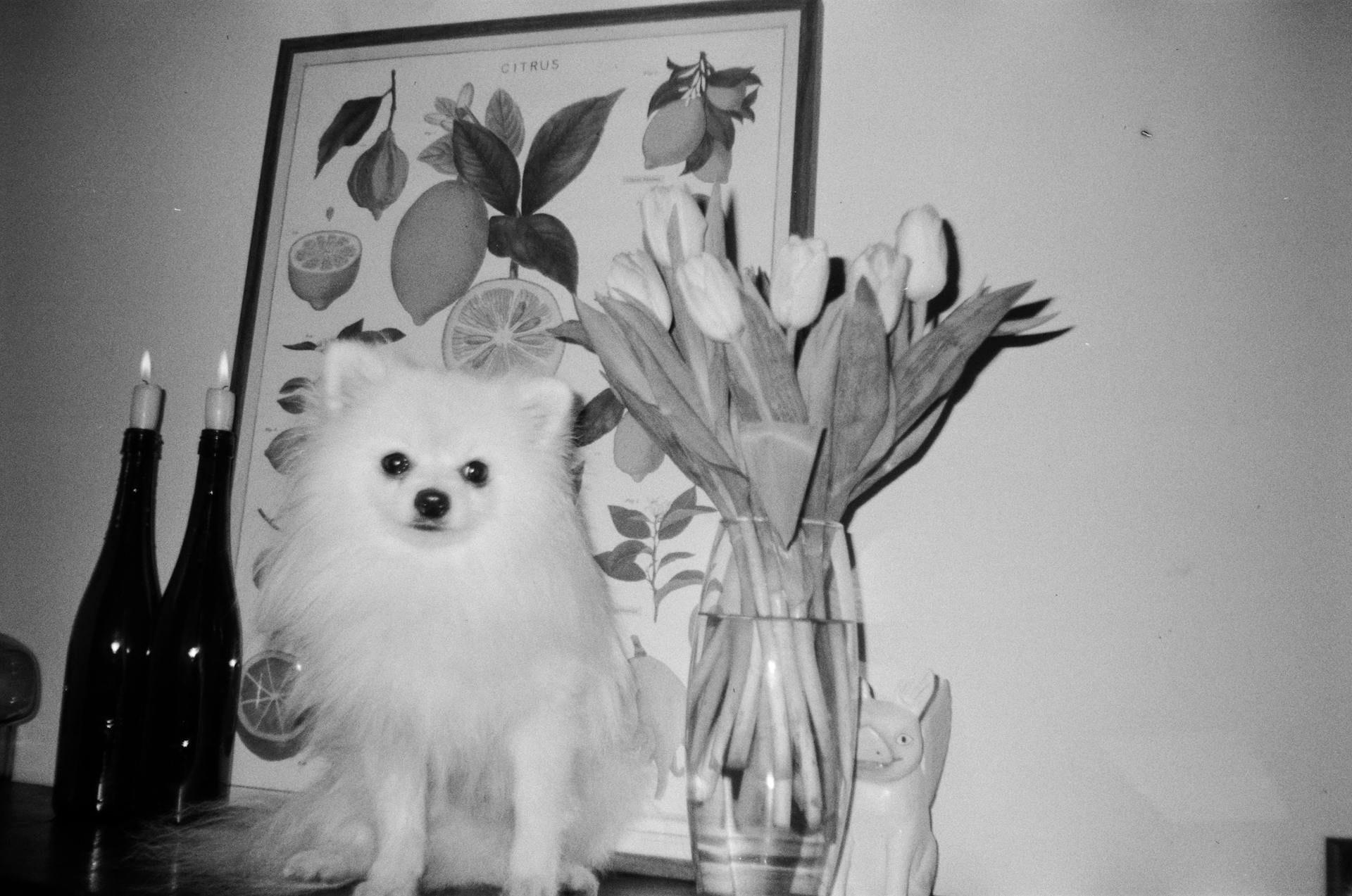
Pomeranian dogs are known for their big personalities and even bigger bark.
Pomeranians are naturally alert and vigilant, which can sometimes be misinterpreted as aggression.
Their small size belies their loud and persistent barking, which can be a challenge for owners.
Pomeranians are highly social animals and thrive on interaction with their human family.
Here's an interesting read: Are Pomeranians Hypoallergenic Dogs
Causes of Barking
Pomeranian dogs bark for a variety of reasons, and understanding what triggers their barking is key to addressing the issue.
A loud, sudden noise is a common stimulus that can set off a Pomeranian's barking. This is because they are protective of their owners and may mistake a sudden, loud noise as a threat.
Identifying the type of bark your Pomeranian is trying to communicate is crucial to getting to the root of the cause. By paying attention to the tone and pitch of their bark, you can determine if they're bored, anxious, in pain, stressed, happy, or alerting you to danger.
A little grunt bark often indicates boredom, so try adding more interaction with your Pomeranian by playing with a favorite toy or showing affection. This can help redirect their energy and reduce barking.
A high-pitched and loud bark, on the other hand, typically means your Pomeranian is alerting you to a stranger or some other event they find threatening.
Training and Prevention
Pomeranians are known to be one of the most vocal dog breeds, but they can learn to communicate in more ways than just barking.
To prevent your Pomeranian from barking in certain situations, it's essential to understand their typical responses to everyday situations. For instance, if you suspect your pup is stressing out from something happening at home, try using techniques like redirecting their attention or providing a calm environment.
Boredom can make your Pomeranian annoyed, and they will retaliate by barking. Given their lively temperament, Poms love activity, and if they have nothing to do and get bored, they'll let you know about their displeasure. Consistency is key in training your Pomeranian, so be sure to use the same series of events to interrupt and redirect their actions.
To train your Pomeranian not to bark excessively, you can try redirecting their attention toward you, teaching the command "sit", and rewarding them with treats. You can also use counter-conditioning by pairing the trigger with something positive, such as treats or toys, to help change your Pomeranian's emotional response to a trigger.
Curious to learn more? Check out: Dog Bites Fingers When Taking Treats
Getting Started
Your Pomeranian puppy doesn't hear your words, they just recognize that you're matching their volume, which will only make them bark more.
A calm attitude is key to training your Pom not to bark excessively. It's essential to stay patient and composed, especially when they're barking persistently.
Poms can get overexcited easily, so if you come home from being gone a while, they'll likely bark with happiness. This is a normal behavior for them, but it's still something you can work on.
You don't want to inadvertently encourage your Pom to bark more by reacting angrily. Instead, show them that you have control over the situation, and they'll be more likely to listen to you.
Preventing in Certain Situations

Pomeranians are one of the most vocal dog breeds, but they can learn to communicate by more than just barking. Picking up on four everyday situations that your pup may be experiencing and their typical responses will help you better understand them.
For example, if it sounds like they are stressing out from something happening at home, try these techniques: redirect their attention toward you, and teach the command "sit" to help them calm down.
You can also use the "be quiet" command, which involves having a treat ready to reward your Pom for stopping their barking. Wait for three seconds of quiet time before rewarding your Pom with the treat, teaching them that the reward is for quiet, not for barking.
If your Pomeranian is barking due to boredom, provide them with a favorite toy or initiate a training session to refocus their energy. A well-exercised and mentally stimulated Pomeranian is less likely to engage in reactive barking.

You can also use window films to obscure your dog's view of passersby, creating a designated "safe space" for your dog to retreat to, or using baby gates to restrict access to areas with high trigger exposure. Managing your dog's environment can help reduce their reactive barking while you work on implementing other strategies.
Addressing Barking Behavior
Pomeranians are known to be "yappy" if not properly trained from a young age. A well-trained Pomeranian is a joy to live with, the opposite can be said for an untrained, spoiled Pomeranian.
To address barking behavior, it's essential to determine the underlying cause of the barking. This can be done by eliminating the stimuli that triggers the barking, as mentioned in How to Stop Pomeranian Barking. By understanding the root cause, you can develop a plan to address the issue.
Some common reasons for barking include separation anxiety, which can be soothed by responding to the Pomeranian's high-pitched barks or whines. You can also use counter-conditioning, a technique that pairs the trigger with something positive, such as treats or toys, to change the Pomeranian's emotional response to a stimulus.
Here are some steps to help you address barking behavior:
- Try to determine the underlying cause of the barking.
- Use techniques such as counter-conditioning and positive reinforcement to change the Pomeranian's emotional response to a stimulus.
- Redirect the Pomeranian's attention to a more productive activity, such as offering a favorite toy or initiating a training session.
- Use the "sit" command to interrupt barking fits and provide a reward for remaining calm.
Separation Anxiety
Separation anxiety is a common issue in Pomeranians, often expressed through high-pitched barking or whining.
If left unaddressed, separation anxiety can lead to destructive behavior.
Pomeranians thrive on companionship, making it essential for owners to spend quality time with them.
Elderly owners, who often have more free time, can benefit from having a Pomeranian as a companion.
The more time a Pomeranian spends with its owner, the more difficult it will be for them to be alone.
To alleviate separation anxiety, owners should respond promptly to their Pomeranian's distress signals.
Related reading: Do German Shepherds like to Sleep with Their Owners
Stop Incessant Behavior
If your Pomeranian is prone to incessant barking, it's essential to understand that small dogs can be "yappy" if not properly trained from a young age. A well-trained Pomeranian is a joy to live with, but an untrained, spoiled one can be a handful.
To stop Pomeranian barking, it's crucial to determine the underlying reason for the barking. This will increase your chances of success. By identifying the stimuli that triggers the barking, you can develop a plan to eliminate it.
Here are the steps to follow:
- Try to determine why your Pomeranian is barking and eliminate the stimuli to bark.
- Have your Pomeranian's favorite treat within reach.
- Praise the Pomeranian barking once he starts by saying 'Good job' and then 'What's the matter?'
- Tell the Pomeranian "Be quiet."
- Wave the treat in front of your Pomeranian's nose. Most Pomeranian barking will stop instantly, because they will be concentrating on smelling and attempting to lick the treat, rather than barking.
- Keep praising the Pomeranian. Tell the Pomeranian he is a good dog for being quiet.
- Allow the Pomeranian to have the treat after 3 seconds of quiet time.
- Wave another treat in front of your Pomeranian if he starts to bark. This time, try not to let your dog have the treat until 5 seconds of quiet time have elapsed.
- Scold your Pomeranian every time he makes a mistake. If the Pomeranian barks, even for just an instant, as you're waving the treat in front of his nose, say "Be quiet" in a louder voice. Then reward the Pomeranian immediately he stops barking.
- Increase the quiet-time intervals by 3 seconds each time: from 3 seconds to 6 seconds to 9 seconds and so on.
By following these steps, you can help your Pomeranian learn to stop barking incessantly.
Hold Your Ground
Holding your ground is crucial when training your Pomeranian to stop barking. This means being consistent and firm in your correction.
Your Pom puppy may stop for a moment in reaction to your correction and then go right back to barking. Keep up your invisible wall until your pup completely relaxes and recognizes that barking is not the right move.
It's essential to remember that this process takes time and patience. Your Pom needs to learn that barking is not an acceptable behavior, and that's where consistent correction comes in.
In situations like this, it's helpful to recall that giving a treat as a reward can go a long way in teaching your Pom good behavior. For instance, if your Pom doesn't react with an excited greeting when someone knocks on the door or rings the doorbell, praise them and give a treat.
See what others are reading: Dogs Back Legs Crossing When Walking
Understanding Pomeranian Behavior
Pomeranians are naturally inclined to be watchdogs, thanks to their Spitz Dog ancestry, which means they're highly sensitive to movement and keenly attuned to their surroundings.
Their barking can be a warning sign that something is amiss, and it's essential to pay attention to the type of bark they're using. Sharp, loud barks often indicate they've sensed danger or a commotion, while softer barks can signal boredom, sadness, or a desire for attention.
It's also worth noting that Pomeranians are intelligent and confident dogs, but can be a bit stubborn at times. With patience and consistent training, they can learn to bark only when necessary.
Here are some common reasons why Pomeranians bark:
- Happy and excited
- Sad and/or Bored
- Seeking attention
- Sick, in pain or distressed
- Responding to other animals
By understanding these triggers and taking steps to address them, you can help your Pomeranian become a well-behaved and happy companion.
Fear
Fear can be a major issue for Poms, especially with loud noises like barking. Replicating the noise and creating positive associations in advance can help. Knocking on an empty table before guests arrive and giving treats for good behavior is a great way to start.
Catching your Pom's attention after they've spotted someone and haven't barked yet is key. Take them out on a leash and say "treat" when you see the neighbor, then give them a reward.
Understanding Diversity
Pomeranians are descended from watchdogs and take their jobs very seriously, which is why it's essential to train them to not bark from an early age.
Their keen sense of hearing and sensitivity to movement make them highly alert to any potential danger, and they'll often bark to warn you of possible threats.
Sharp, loud barks usually mean they've sensed an intruder or commotion and are trying to protect their territory.
A Pomeranian may also bark if they're happy and excited, sad and/or bored, seeking attention, sick, in pain, or distressed, or responding to other animals.
Here are some common reasons why Pomeranians bark:
- Happy and excited
- Sad and/or Bored
- Seeking attention
- Sick, in pain or distressed
- Responding to other animals
Ignoring your Pomeranian's barking and not giving in to their demands can be an effective way to teach them that barking won't get them what they want.
Temperament
The Pomeranian's temperament is one of its most defining characteristics. It's known for being ever-cheerful and fun-loving, with a great deal of energy that it loves to burn off through games and adventures.
This breed is intelligent and confident, but can also be a bit stubborn at times. Training a Pomeranian requires patience and consistency, but it's not impossible.
One of the things to keep in mind is that Pomeranians are not particularly outgoing with strangers. They can be a bit wary of new people and may take some time to warm up to them.
Despite their small size, Pomeranians make enthusiastic watchdogs and will often bark excessively when they sense something is amiss. However, they're not effective protection dogs and shouldn't be relied upon for security.
Overall, Pomeranians are entertaining companions that thrive on interaction and attention. They're best suited for families or individuals who can provide them with plenty of exercise and mental stimulation.
Here's an interesting read: Training Your Dog Not to Bark
Identify Your Triggers
Pomeranians are naturally alert dogs and will bark to alert you to potential threats or dangers. High-pitched and loud barks are often a sign that your Pom has spotted a stranger or something they perceive as a threat.
To address reactive barking, it's essential to identify the specific triggers that cause your Pomeranian to bark. Observe your dog closely to determine what situations or stimuli provoke their barking, such as encountering other dogs, strangers approaching, or loud noises.
Your Pomeranian may bark due to boredom, anxiety, or pain, so it's crucial to understand the underlying cause of their barking. A little grunt bark can be a sign of boredom, which can be alleviated by adding more interaction with your Pom.
Once you understand the triggers, you can develop a targeted plan to address the issue. This might involve rewarding your Pomeranian for remaining calm in the presence of the trigger, or finding ways to minimize the trigger's impact.
Knowing the specific triggers that cause your Pomeranian to bark will help you address the issue more effectively. By understanding what sets off their barking, you can take steps to prevent it from happening in the first place.
Featured Images: pexels.com


